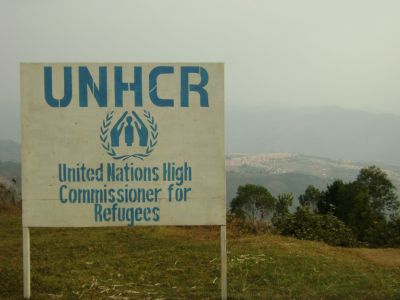 The above title is taken from the last line of a recent New York Times article, and are the words of an unidentified senior U.N. official. The senior official is referring to the U.N.’s overdue investigation into the humanitarian crisis that has occurred in the Congo, formerly Zaire, in the ten years following the 1994 genocide in Rwanda—an investigation that yielded an official U.N. report just two days ago. Drafts of this report were released in late August, and they accused Congolese rebels and Tutsi-led forces from Rwanda of committing genocide against Hutu populations in U.N.-administered camps in the Congo. The final report offered less direct accusations regarding acts of genocide, as told in the latest Times article on the matter.
The above title is taken from the last line of a recent New York Times article, and are the words of an unidentified senior U.N. official. The senior official is referring to the U.N.’s overdue investigation into the humanitarian crisis that has occurred in the Congo, formerly Zaire, in the ten years following the 1994 genocide in Rwanda—an investigation that yielded an official U.N. report just two days ago. Drafts of this report were released in late August, and they accused Congolese rebels and Tutsi-led forces from Rwanda of committing genocide against Hutu populations in U.N.-administered camps in the Congo. The final report offered less direct accusations regarding acts of genocide, as told in the latest Times article on the matter. President Paul Kagame of Rwanda and his government are furious about the accusations in the drafted reports and the final report. Though this is the case, Rwanda decided not to follow through on its threat to remove the thousands of its committed troops from ongoing U.N. peacekeeping missions—including a significant number currently contributing to the peacekeeping efforts in Sudan.
The validity of the U.N.’s accusations and findings are still to be evaluated, but there is one aspect of these findings that one should question. The U.N. refugee camps that were established in what was then Zaire, housed and protected an abundance of Hutu extremists and Interahamwe soldiers who participated in and led the genocide. The U.N. either made little effort to extract these genocidal perpetrators from the camps or made little effort to consider the nature of the refugees that they were housing in their camps. Either way, the negligence of the U.N. caused the new Tutsi-led government in Rwanda immense frustration, knowing that many of the leaders and militants who slaughtered masses of their ethnic brethren were in U.N. safe havens.
The Rwandan government and forces took it upon themselves to try to apprehend the genocidal participants and encourage Hutu populations to return to Rwanda. I do not know whether the U.N. accusations of genocide carried out by the Tutsi-led Rwandan government against Hutus in the Congo are accurate, but I do know that the U.N.’s misguided actions after the 1994 genocide in Rwanda were one cause of the atrocities. And it should also be noted that because of its mishandling of the situation, the U.N. may have a vested interest in casting blame away from themselves and on another actor for these atrocities in the Congo (the report was investigated and written by the U.N.’s Office of the High Commissioner for Human Rights, despite requests from Rwanda to include a second independent source for investigating the conflict).
Now to consider the title of the post. After several attempts to investigate incidents in the Congo, the U.N. was finally able to gain access to the Congo in order to look into the post-genocide humanitarian disasters and the following decade of atrocities in the broken down country. The senior U.N. official said to this breakthrough, “I guess you could say that’s when the U.N. woke and said, ‘Hmm, we can accomplish something here.’”
If only the U.N. were to wake up and utter that phrase when genocide, mass murder and other crimes against humanity were happening. The types of investigations, like the one on the Congo, are helpful for studying humanitarian crises, finding solutions for these calamities and obtaining justice, but the U.N. needs to do more than that. Why didn’t the U.N. realize that they could accomplish something in Rwanda during the genocide? Why, when the U.N. supposedly takes action, its soldiers standby and allow slaughtering to continue, as in Srebrenica? The peacekeeping missions that the U.N. employs, like those in Rwanda and Bosnia, during humanitarian disasters and genocides do not accomplish anything in respect to protecting lives and combating the perpetrators of atrocities.
The U.N. fails to produce effective policies and action at the times of the greatest humanitarian crises—genocide, ethnic cleansing, mass murder and the like. Moreover, despite its total lack of contribution to solving these crises, the U.N. has the audacity to point fingers at groups for their brutal acts without claiming any shred of responsibility for itself. Rwandan officials are particularly upset, because, in spite of the evils that the Tutsi forces may have committed after the genocide, they were the contingent that put a stop to the genocide. The U.N. stood by and did nothing. In dealing with humanitarian crises, the U.N. needs to be more than a post-catastrophe analyst.
If Tutsi forces and Congolese rebels committed the atrocities delineated in the U.N. report, then the proper diplomatic and legal steps should be taken by the international community. But for the U.N. to be a credible source for making accusations and solving problems regarding humanitarian crises, it needs to prove that it can actively effect outcomes of humanitarian disasters in a positive way. That means protecting lives and stopping genocidal and inhumane regimes, whether it be diplomatically or militarily. The U.N. must also acknowledge and take responsibility for its plethora of disgraceful decisions in times of great humanitarian need.
No comments:
Post a Comment